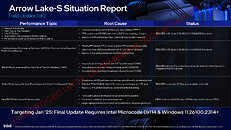- Joined
- Oct 9, 2007
- Messages
- 47,794 (7.40/day)
- Location
- Dublin, Ireland
| System Name | RBMK-1000 |
|---|---|
| Processor | AMD Ryzen 7 5700G |
| Motherboard | Gigabyte B550 AORUS Elite V2 |
| Cooling | DeepCool Gammax L240 V2 |
| Memory | 2x 16GB DDR4-3200 |
| Video Card(s) | Galax RTX 4070 Ti EX |
| Storage | Samsung 990 1TB |
| Display(s) | BenQ 1440p 60 Hz 27-inch |
| Case | Corsair Carbide 100R |
| Audio Device(s) | ASUS SupremeFX S1220A |
| Power Supply | Cooler Master MWE Gold 650W |
| Mouse | ASUS ROG Strix Impact |
| Keyboard | Gamdias Hermes E2 |
| Software | Windows 11 Pro |
Intel today, in a letter to the press, presented an overview of the lower than expected performance of its latest Core Ultra "Arrow Lake-S" desktop processors, which the company released this October, to less than enthusiastic reviews. The top Core Ultra 9 285K ended up barely faster than the previous Core i9-14900K in gaming performance, and moderately faster in applications. AMD's November release of the Ryzen 7 9800X3D extended the green team's lead over Intel, prompting Intel to get to work on identifying why "Arrow Lake-S" isn't as fast as the company hoped, and if there was something the company could do about it.
Last month, Intel announced that it had identified probable reasons why "Arrow Lake-S" underperforms and that it is working on a combination of fixes that include OS-level updates from Microsoft, some motherboard-vendor level fixes to their UEFI setup programs, and a microcode update for its processors. Intel's microcode updates have been in the news throughout 2024, as one such update proved crucial in fixing the faulty voltage regulation behavior of its Core "Raptor Lake" processors, which was causing irreversible damage to the chips. Today, the company released documentation that highlights all issues the company identified by Intel, their technical root cause, and what's been done about it. Long story short—most of these issues are already addressed, but the Microcode update should be in circulation by January 2025, when the company expands its Core Ultra 200-series desktop processors with 65 W models.
Update Dec 19th: We tested the new OS patches, and unfortunately we have to report that this not a general fix for Arrow Lake, but just a fix for performance problems specific to 24H2. More in our article.
Update Dec 20th: Last night, ASUS released a non-Beta BIOS with microcode 0x114, we tested it and the findings are included in the Dec 19 article linked above.

The first set of performance issues are caused due to the way the OS scheduler works with the various kinds of CPU cores on "Arrow Lake-S," which was causing higher delta (variation) in scores among benchmark runs with identical settings. There is also less than expected scores in 1T (single thread) settings of certain synthetic benchmarks. What's even worse, there is a 50% increase in DRAM latency during the benchmarks. Performance overall is reduced on the latest Windows 11 24H2 release, compared to the older 23H2.


Intel confirms that the first set of issues are caused due to faulty collaborative power management between the OS and the processor. UEFI CPPC establishes a set of standards by which an OS can send information about the performance demands of its various processes and services to the hardware power management unit, letting it alter performance parameters such as core scheduling/parking, voltage, clock speeds, among others. Specifically, Intel says that the processor power management (PPM) settings at the OS-level for Windows 11 24H2 are faulty. This alone accounts for a massive 6% to 30% loss in performance. Intel reports that all these issues have been solved by version 26100.2161 (KB5044384), or the November 2024 "patch Tuesday" update of Windows 11 24H2.

The second set of performance issues are caused due to Intel Application Performance Optimizer (APO) not delivering on performance uplifts along expected lines. APO is an application-specific set of processor optimizations Intel has been releasing with its processors over the last few generations. A faulty implementation of APO on the OS level meant that PPM settings on APO profiles don't apply correctly. Another issue noticed was that motherboard BIOS versions released to CPU reviewers around the time of Core Ultra 9 285K reviews (October) didn't have APO enabled by default. These together cost anywhere between 2% to 14% performance in games that have APO profiles. Intel says that these issues are solved with the November "patch Tuesday" update to Windows 11 24H2, just like the first set of problems.
Another rather bizarre set of issues affected games using EAC (Easy Anti-Cheat), triggering a BSOD at launch, when running on Windows 11 24H2. This was due to a bug with the kernel-mode driver (KMD) of EAC when paired with Windows 11 24H2, which was allegedly exacerbated with virtualization-based security (VBS) being disabled by the user (Microsoft enables this by default for 24H2). Intel says that it's been working with Epic Games to distribute an updated EAC KMD to game developers.


The fourth set of performance issues are caused due to combination of incorrect default settings in motherboard UEFI setup programs. Some of these are glaring omissions, such as PCI Resizable BAR being disabled by default, APO being disabled, wrong Compute Ring Frequency, a setting that affects intercore latency, and integrated memory controller Gear mode, which affects the ratio between the IMC frequency and DRAM frequency, enabling Gear 4 even in lower frequencies that can work perfectly stable with Gear 2. These could affect performance by anywhere between 2% to 14%. Intel says that it's been pursuing motherboard vendors to release BIOS updates that fix these defaults, and these should already be in circulation.
Lastly, we reach the heart of the matter, the 0x114 Microcode Update. This update is said to include several "performance enhancements," and the company's motherboard partners are working to integrate it with their future BIOS updates. Intel says that the Microcode should cause a "single digit percentage performance enhancement" across games. This is a geomean obtained over 35 games, which means the 285K should end up faster than the Core i9-14900K, and inch closer to the Ryzen 7 9800X3D in gaming performance.
Intel says that the 0x114 Microcode Update is being targeted for January 2025.
View at TechPowerUp Main Site
Last month, Intel announced that it had identified probable reasons why "Arrow Lake-S" underperforms and that it is working on a combination of fixes that include OS-level updates from Microsoft, some motherboard-vendor level fixes to their UEFI setup programs, and a microcode update for its processors. Intel's microcode updates have been in the news throughout 2024, as one such update proved crucial in fixing the faulty voltage regulation behavior of its Core "Raptor Lake" processors, which was causing irreversible damage to the chips. Today, the company released documentation that highlights all issues the company identified by Intel, their technical root cause, and what's been done about it. Long story short—most of these issues are already addressed, but the Microcode update should be in circulation by January 2025, when the company expands its Core Ultra 200-series desktop processors with 65 W models.
Update Dec 19th: We tested the new OS patches, and unfortunately we have to report that this not a general fix for Arrow Lake, but just a fix for performance problems specific to 24H2. More in our article.
Update Dec 20th: Last night, ASUS released a non-Beta BIOS with microcode 0x114, we tested it and the findings are included in the Dec 19 article linked above.

The first set of performance issues are caused due to the way the OS scheduler works with the various kinds of CPU cores on "Arrow Lake-S," which was causing higher delta (variation) in scores among benchmark runs with identical settings. There is also less than expected scores in 1T (single thread) settings of certain synthetic benchmarks. What's even worse, there is a 50% increase in DRAM latency during the benchmarks. Performance overall is reduced on the latest Windows 11 24H2 release, compared to the older 23H2.


Intel confirms that the first set of issues are caused due to faulty collaborative power management between the OS and the processor. UEFI CPPC establishes a set of standards by which an OS can send information about the performance demands of its various processes and services to the hardware power management unit, letting it alter performance parameters such as core scheduling/parking, voltage, clock speeds, among others. Specifically, Intel says that the processor power management (PPM) settings at the OS-level for Windows 11 24H2 are faulty. This alone accounts for a massive 6% to 30% loss in performance. Intel reports that all these issues have been solved by version 26100.2161 (KB5044384), or the November 2024 "patch Tuesday" update of Windows 11 24H2.

The second set of performance issues are caused due to Intel Application Performance Optimizer (APO) not delivering on performance uplifts along expected lines. APO is an application-specific set of processor optimizations Intel has been releasing with its processors over the last few generations. A faulty implementation of APO on the OS level meant that PPM settings on APO profiles don't apply correctly. Another issue noticed was that motherboard BIOS versions released to CPU reviewers around the time of Core Ultra 9 285K reviews (October) didn't have APO enabled by default. These together cost anywhere between 2% to 14% performance in games that have APO profiles. Intel says that these issues are solved with the November "patch Tuesday" update to Windows 11 24H2, just like the first set of problems.
Another rather bizarre set of issues affected games using EAC (Easy Anti-Cheat), triggering a BSOD at launch, when running on Windows 11 24H2. This was due to a bug with the kernel-mode driver (KMD) of EAC when paired with Windows 11 24H2, which was allegedly exacerbated with virtualization-based security (VBS) being disabled by the user (Microsoft enables this by default for 24H2). Intel says that it's been working with Epic Games to distribute an updated EAC KMD to game developers.


The fourth set of performance issues are caused due to combination of incorrect default settings in motherboard UEFI setup programs. Some of these are glaring omissions, such as PCI Resizable BAR being disabled by default, APO being disabled, wrong Compute Ring Frequency, a setting that affects intercore latency, and integrated memory controller Gear mode, which affects the ratio between the IMC frequency and DRAM frequency, enabling Gear 4 even in lower frequencies that can work perfectly stable with Gear 2. These could affect performance by anywhere between 2% to 14%. Intel says that it's been pursuing motherboard vendors to release BIOS updates that fix these defaults, and these should already be in circulation.
Lastly, we reach the heart of the matter, the 0x114 Microcode Update. This update is said to include several "performance enhancements," and the company's motherboard partners are working to integrate it with their future BIOS updates. Intel says that the Microcode should cause a "single digit percentage performance enhancement" across games. This is a geomean obtained over 35 games, which means the 285K should end up faster than the Core i9-14900K, and inch closer to the Ryzen 7 9800X3D in gaming performance.
Intel says that the 0x114 Microcode Update is being targeted for January 2025.
View at TechPowerUp Main Site







